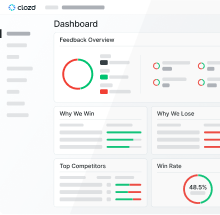
Are You Losing Because of Price?
Pricing is frequently cited by salespeople as a key reason for lost sales opportunities.
At Clozd, we help our clients validate the reasons why they win and lose by conducting in-depth interviews with the buyers at their won and lost accounts.
The impact of pricing on their final decision is frequently a topic we explore with buyers.
Over the course of time, and across thousands of win-loss interviews for clients in various industries, we’ve noticed some trends emerge relating to the impact pricing can have on vendor selection. It is a common decision factor, but not always in the way a sales rep might expect.
This interview with Clozd founder, Spencer Dent, explores some of these pricing trends, which can be insightful for pricing and packaging teams, sales leadership, and sales enablement teams.
Interviewee Profile: Spencer Dent

Spencer Dent is one of the founders of Clozd.
Spencer oversees win-loss program delivery for Clozd clients, manages the Clozd team of consultants, and acts as Clozd’s chief research methodologist. After graduating with an MBA from Duke’s Fuqua School of Business, Spencer joined Bain & Company. As a case team leader at Bain, Spencer oversaw projects across Bain’s go-to-market and sales force effectiveness practices for an impressive set of B2B clients in various industries. After Bain, Spencer joined Qualtrics where he established Qualtrics’ sales operations and strategy functions, working closely with the global head of sales to optimize sales productivity, reporting, and processes globally.
We sat down with Spencer to get his perspective on the impact pricing can have on the final outcome of sales opportunities.
Interview: Influence of Pricing on Deal Outcomes
Spencer, I’m excited to talk about pricing with you today. You’ve personally conducted in-depth, win-loss interviews for a wide range of clients in various industries. If there is one key takeaway about the influence of pricing on deal outcomes, what would it be?
That’s a great question. I would say it’s that sales reps rarely have the whole story and often get part or all of the story wrong. For example, we often hear “we lost on price” but that is not specific enough. The immediate reaction to that rationale is “we are overpriced; we need to lower prices” but “we lost on price” is not precise enough to make a strategic decision. Most often the total cost of the solution isn’t the issue. Perhaps the buyer couldn't get comfortable with their internal ROI equation meaning you did not justify the value of your solution, or the package was misaligned, or the pricing model felt risky to them.
The overall price tag is rarely the reason for winning or losing a deal in B2B environments because solutions often are differentiated and buyers expect the prices to be different. Very often, the solution that is being offered is too much relative to their needs. For the buyer it can feel like buying a sandwich and the vendor requires you to buy a combo meal with a giant bag of chips for double the price of the sandwich. So you go next door where you can buy just the sandwich.
Other times, the buyer sees the difference in what is being offered and can’t justify the difference in the price. The sales rep hasn't shown the buyer enough value to justify the investment. B2B decision makers don't make decisions based off of, “is this dollar amount too high?” It's, “is this dollar amount too high for me to justify.” Right? If you say you lost on price, you either didn't justify the value or you did justify the value and you have the wrong package.
Another deal killer that gets blamed on pricing is the pricing model. I might be perfectly happy with your price. I feel totally comfortable justifying the price point and I feel I have the right package for my needs. But I don’t know how my price is going to change based on your pricing model so I’m nervous to lock myself into an agreement with you. Think about your cable bill, it feels great for the first 12 months then it changes and you feel stuck. It’s the same thing for your software subscription. Buyers don’t want to feel uncomfortable and locked in to the point where they lose control.
Packaging Considerations
Interesting. Those are all things we’ll dive a little deeper into throughout this interview. Tell me a little more about this idea of offering the right package.
Packaging an offering is one of the hardest things to do in business. In software, you can package by modules, you can package by more advanced features within modules, you can package by users, etc. That’s one of the reasons this is hard. There are so many options that it’s easy to overcomplicate. You have to identify the sweet spot based on what your target customer wants.
Everyone wants to chase bigger deals but offering a simple solution can accelerate sales cycles, increase win rates, and raise your Customer Lifetime Value (CLV) if you create the right upsell path.
We often see buyers choose to go with a lower end competitor because it is easier to justify. They prefer the more premium offering but even though they prefer the premium offering and would like to eventually graduate into that solution, if the lower end competitor begins to offer some of those premium features, it’s no longer a given.
Simplified Pricing Models
What are some other common challenges with pricing?
Another thing that we see is overly complex pricing models.
Companies like to make their pricing transparent but this can backfire if the model is too complex.
If buyers aren't sure how the cost will change over time, you may have a problem. If the company’s pricing model requires a lot of inputs and assumptions that, if modified only slightly, can swing the price for the buyer, then you may have a problem.
We have seen a lot of our clients lose deals, not because the buyer has an issue with the price today, but because the buyer is afraid of what the price is going to be in the future. When the pricing model requires multiple assumptions or estimates that can swing the price dramatically, buyers can become gun shy and go with another, low risk model.
Losing Trust During the Sales Process
So, it sounds like pricing complexity can scare buyers. How else might a vendor lose the trust of the buyer during the sales process?
Correct, buyers don’t like black box pricing. They want to understand how you came up with the price and how it will change.
A quick way to lose the buyer’s trust is to come with a high price that you subsequently discount by 50%. Sometimes this has more to do with how you communicate the price than the actual model.
The more up front you can be about pricing in terms of explaining the model, the range, and the drivers, the more trust will be built and the easier it will be to justify your value.
How might a vendor recognize if they have this problem?
If buyer’s express difficulty in obtaining a quote, or at least a range from you, until you've done a significant amount of selling to them. I understand why organizations do this in the sales cycle but as a buyer, it’s really frustrating.
Right, as a buyer, I want to know if I’m wasting my time or if we should continue conversations. At a minimum, providing a ballpark price goes a long way. Do you feel there is a common place or time in the sales cycle where you see buyers lose trust?
The fastest way to lose trust in the sales process is to come in with a really high quote and then immediately show willingness to cut the price in half or more. It feels underhanded. It feels dirty to the buyer.
So how do you do that differently?
Look, everyone gets that a company wants to make as much money as possible in a negotiation. And the buyer realizes that you are going to negotiate. So approach the conversation in a healthy way . . . provide them ranges of the cost of your service and ask them what they are planning to spend and ask them for a range of what other vendors have proposed and what they are including and then put your best foot forward in your proposal.
You don’t have to necessarily ask those questions in that order but you will actually build trust if you say, “I want you to choose us. I want to make sure that we are as competitive as possible on price. I’m going to ask a couple of questions to help us shape your proposal so that we land as close to your mark as possible.”
Is that always possible?
No. Sometimes you are late to the deal and have to give a number. In that case, I would still try to give a range, tell them that some discounts may be available, and that you will do what you can to make sure that the price isn’t the driver for their decision.
What other recommendations would you give organizations when it comes to discounting?
The thing is, buyers are happy to get discounts but they want clarity. Be more clear in describing how the price is built and what would need to change for them in order for the price to change on your side. Put logic behind the changes.
That makes sense. Explain why it’s now 30% cheaper. Is it okay if the answer is “Because we didn't want to lose your business?”
Yeah. Just describe it honestly . . . ”we have pressure to hit our quarterly numbers and we are able to offer this deal right now but it may go away next week.” Or, “There's a lot of pressure from sales leadership to get deals through. That’s why I can do this right now.”
The other thing about discounts is that you need to make sure it meets the buyer’s timeline. Don't put an offer in front of them unless it meets their timeline. There's nothing worse than saying, “I can get you 30% off, but you have to close by the end of the month" if there's no way they can do that. So, understand their timeline first and whether or not your offer is practical. Make sure the discount timeline is feasible based on their budget and decision timeline.
Total Cost of Ownership
What are some other common ways that pricing might affect the outcome of a deal?
Sophisticated buyers will care about the total cost of ownership. They don’t just look at the annual license fee. They look at the setup fee and switching costs. They look at the implementation cost. They look at how much time it’s going to take to train users to use the new offering. So, your license or the cost of the service or product you're selling may be an annual cost, but there are many other factors that buyers consider.
Simply put, sophisticated buyers consider the cost of the services plus the cost of the product versus the cost of getting the solution setup and implemented.
Sophisticated buyers also consider the macro effect. Your price for an equivalent service could be the same as another vendor. Right? If I’m a buyer, it might cost me the exact same amount to use Software A versus Software B; but, because I need to integrate with my ERP system, which is a sister company of Software A, it's easier for me to contract with Software A.
In reality, the deal was lost on price because you were already behind. Considering the overall ecosystem is valuable when deciding which deals to go after or considering how much effort will be required to win the deal because you’re already starting from behind.
Other elements of the buyer’s infrastructure, like partner relationships, can influence the price-to-value equation. That's what I would call it. The price-to-value equation. If they already have an existing relationship with another vendor, even if they're gonna spend the same amount of money, the likelihood of going with established relationship is higher.
That’s really insightful. Spencer. This has been great. I appreciate you taking the time and sharing your insights on pricing.
Sure. I’m happy to sit down and share some perspectives on this topic.
Additional Resources
For additional insights on how pricing can impact the outcome of sales opportunities, refer to this previous blog post: Win-Loss Themes - What “Your Price Is Too High” Really Means
If you’re interested in learning how to improve your win rates and pricing through win-loss interviews and analysis, contact us here.











.svg)










.svg)

.svg)




